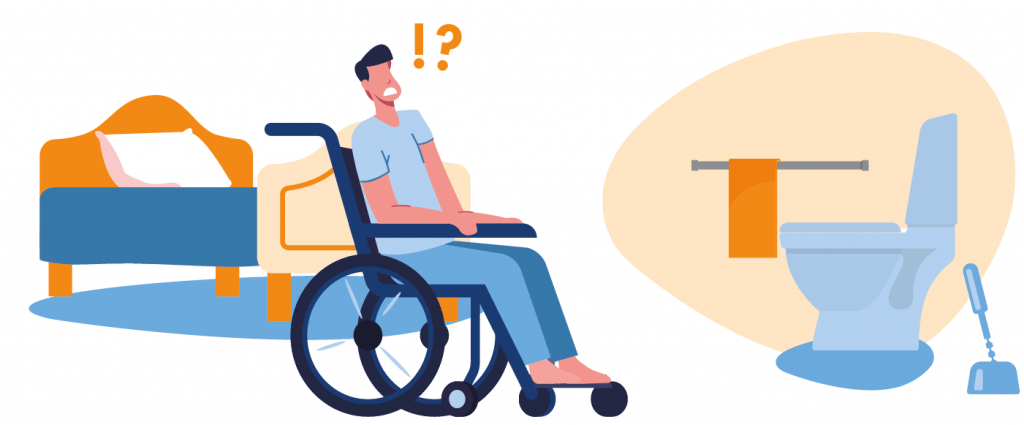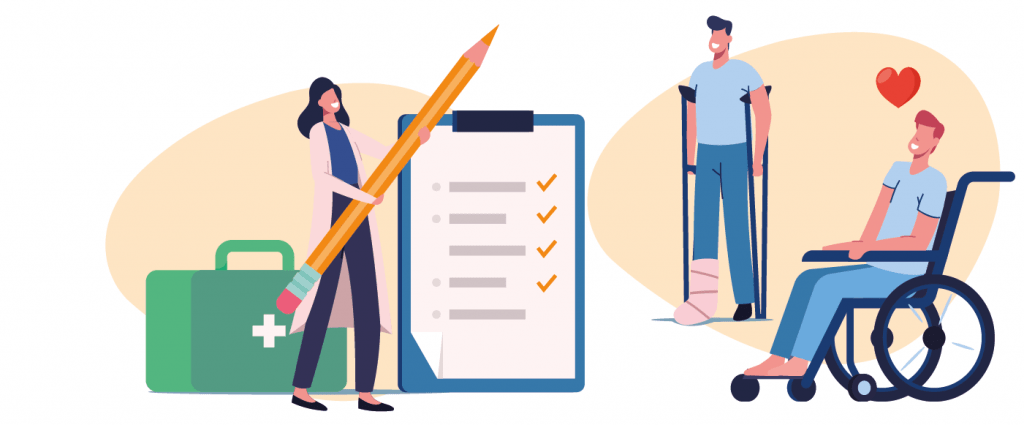How to handle sudden bedwetting in adults with limited mobility
Most commonly known as bedwetting, nocturnal enuresis is the involuntary passing of urine at night1. While bedwetting is usually experienced by children2, it’s also relatively common in older individuals; in fact, 0.5-1% of adults wet the bed3. It’s even more common as you age, especially if you have other conditions, such as dementia4 or limited mobility5.
Suddenly developing bedwetting as an adult can be very distressing and embarrassing – not to mention the inconvenience of extra laundry! We’ve gathered our best tips for managing nocturnal enuresis.

Cause of sudden bedwetting in less mobile adults
Many things can cause sudden bedwetting in adults, particularly those with limited mobility, from lifestyle factors to medical issues, including:
- age-related diseases, such as multiple sclerosis, Parkinson’s and dementia
- dehydration
- stones in the urinary tract
- prostate issues
- bladder cancer6
- genetics
- a smaller than average bladder capacity
- sleep disorders
- constipation7
- diabetes
- urinary tract infections (UTIs)
- medication side effects8
- other gastrointestinal issues, such as IBS9
- abnormal levels of anti-diuretic hormone
- stress and anxiety
- an overactive bladder10
- bladder irritants, such as alcohol and coffee.11
Furthermore, limited mobility, whether caused by a disability or age, can worsen the symptoms of sudden bedwetting in adults.12 This is partly due to a physical inability to get to the toilet in time and because mobility issues can exacerbate mental health issues13.

Managing sudden bedwetting in adults
There are plenty of things you can do to manage sudden bedwetting in adults. These break down into preventive measures, medications and dealing with leaks.

Preventing sudden bedwetting
To decrease the likelihood of experiencing sudden bedwetting as an adult, you could try:
- limiting fluid intake before bedtime
- decreasing your caffeineintake
- emptying your bladder fully before bed
- making the bathroom easier to access at night – for adults with limited mobility, you could install a raised toilet seat and ensure the path to the toilet is clear. You could even consider a bedside commode or bedpan
- monitoring bowel movements; this will help you to determine if constipation is an issue14
- setting random alarms to go to the toilet during the night. The fact that the alarms differ from night to night prevents the bladder from needing to empty at a set time15
- bladder retraining; go to the toilet at set times during the day and gradually increase the intervals between trips to encourage your bladder to hold urine for longer16
- cutting down other bladder irritants, such as alcohol, artificial sweeteners and sugar drinks17
- pelvic floor exercises
- losing weight, as being overweight can put pressure on your bladder18.
Medications to decrease nocturnal enuresis
There are also medical interventions that your healthcare provider might suggest to manage sudden bedwetting in adults. These may include:
- ensuring that other issues that impact urinary incontinence are properly medicated. In less mobile adults, this could mean treating conditions such as arthritis, hip deformity and poor eyesight. It could also involve treating constipation to restore continence19
- changing or reducing non-essential medications that negatively impact continence, such as sleeping pills
- introducing medicines that reduce the amount of urine your kidneys produce or calm an overactive bladder
- surgical interventions to improve continence.20
Managing leaks at night
Finally, should you still experience leaks at night, maintain comfort by:
- choosing the correct continence productsfor your situation. iD Slip is an excellent solution for sudden bedwetting in less mobile adults. This product range features all-in-one briefs in various absorption levels that are comfortable and secure and offer instant dryness. They are easy to change while lying down, meaning they’re ideal for caregivers of adults with limited mobility
- ensuring that continence products are applied properly to minimise leaks onto bedclothes
- wearing additional clothing to ensure your continence product remains in place21
- considering using room deodorisers if you find that the odour is an issue
- after an accident, washing and using an emollient cleansing gel to prevent skin chafing
- using products to protect your mattress like waterproof mattress protectors or disposable bed pads22
- sprinkle bicarbonate of soda onto wet patches to absorb the urine and eliminate the odour23.
By following these tips, we’re sure you can conquer sudden bedwetting in adults and get a restful night’s sleep!

Sources
1 “Diagnosing and Treating Bed Wetting in the Elderly”, Agingcare.com, n.d., Source: https://www.agingcare.com/articles/bed-wetting-in-elderly-133823.htm
2 “Bedwetting in children”, NHS, 27 April 2020, Source: https://www.nhs.uk/conditions/bedwetting/
3 “What is World Bedwetting Day and why is it important?”, Bladder & Bowel UK, 25 May 2021, Source: https://www.bbuk.org.uk/blog/what-is-world-bedwetting-day-and-why-is-it-important/
4 “Toilet problems, continence and dementia”, Alzheimer’s Society, 23 February 2021, Source: https://www.alzheimers.org.uk/get-support/daily-living/toilet-problems-continence
5 “Treatment of Overactive Bladder and Incontinence in the Elderly”, Darshan Shah, MD, & Gopal Badlani, MD, 2002, Source: https://www.ncbi.nlm.nih.gov/pmc/articles/PMC1476020/
6 “What Causes Incontinence In The Elderly At Night?”, Samantha Hall, 10 December 2018, Source: https://www.incontinence.co.uk/what-causes-incontinence-in-the-elderly-at-night
7 “What Is Nocturnal Enuresis (Bedwetting)?”, Urology Care Foundation, n.d., Source: https://www.urologyhealth.org/urologic-conditions/bed-wetting-(enuresis)
8 “Diagnosing and Treating Bed Wetting in the Elderly”, Agingcare.com, n.d., Source: https://www.agingcare.com/articles/bed-wetting-in-elderly-133823.htm
9 “Toilet problems, continence and dementia”, Alzheimer’s Society, 23 February 2021, Source: https://www.alzheimers.org.uk/get-support/daily-living/toilet-problems-continence
10 “Ask the doc: what causes bedwetting in adults? (and how can I make it stop?)”, National Association for Continence, n.d., Source: https://www.nafc.org/bhealth-blog/ask-the-expert-what-causes-bedwetting-in-adults-and-how-can-i-make-it-stop
11 “Adult Bedwetting (Enuresis)”, Beaumont, n.d., Source: https://www.beaumont.org/conditions/enuresis
12 “Adult Bed-wetting: Causes, Diagnosis & Treatment”, Jennifer Hines, 16 August 2018, Source: https://www.alaskasleep.com/blog/adult-bedwetting-causes-diagnosis-treatment
13 Ibid.
14 “10 tips to control bedwetting in children and adults”, Hanna Landman, n.d., Source: https://www.nafc.org/bhealth-blog/10-tips-to-control-bedwetting-in-children-and-adults
15 “Adult Bedwetting (Enuresis)”, Beaumont, n.d., Source: https://www.beaumont.org/conditions/enuresis
16 “Bed-Wetting in Adults”, Stephanie Watson, 20 January 2021, Source: https://www.webmd.com/urinary-incontinence-oab/bed-wetting-in-adults
17 “Causes of Bed-Wetting in Adults and How to Treat It”, Kimberly Holland, 25 October 2018, Source: https://www.healthline.com/health/adult-bed-wetting
18 “Nocturnal Enuresis – Causes of bedwetting in adults”, Gail Ford-Rowley, 10 June 2021, Source: https://www.hartmanndirect.co.uk/information-centre/nocturnal-enuresis-bedwetting-in-adults/
19 “Treatment of Overactive Bladder and Incontinence in the Elderly”, Darshan Shah, MD, & Gopal Badlani, MD, 2002, Source: https://www.ncbi.nlm.nih.gov/pmc/articles/PMC1476020/
20 “Bed-Wetting in Adults”, Stephanie Watson, 20 January 2021, Source: https://www.webmd.com/urinary-incontinence-oab/bed-wetting-in-adults
21 “Nocturnal Enuresis – Causes of bedwetting in adults”, Gail Ford-Rowley, 10 June 2021, Source: https://www.hartmanndirect.co.uk/information-centre/nocturnal-enuresis-bedwetting-in-adults/
22 “What Is Nocturnal Enuresis (Bedwetting)?”, Urology Care Foundation, n.d., Source: https://www.urologyhealth.org/urologic-conditions/bed-wetting-(enuresis)
23 “Tips on caring for people with learning disabilities – bedwetting”, NT Contributor, 8 July 2011, Source: https://www.nursingtimes.net/archive/tips-on-caring-for-people-with-learning-disabilities-bedwetting-08-07-2011/
